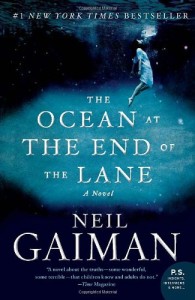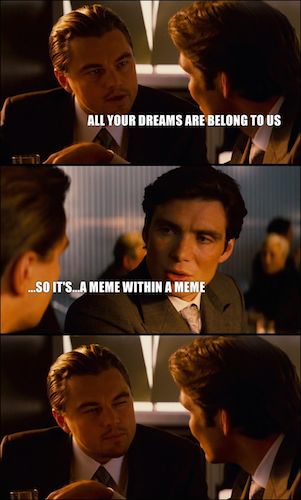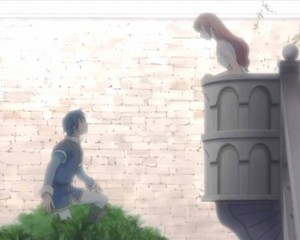by Naomi L. | February 25, 2015 | Blog, Creative Writing, What If? Writing Prompts |
Here are some more “What If?” Writing Prompts to cover my creative writing posts while I catch up with my grad school work. The theme this week is a genre pairing that I have yet to feature a second time in this segment: mystery and suspense. Enjoy trying out these ideas, and please feel free to add more of your own! Good luck!
 What if… you discovered your parents weren’t who you thought they were?
What if… you discovered your parents weren’t who you thought they were?
What if… whenever you answered that persistent knocking at your door, nobody were there?
What if… you were followed home by a strange animal?
What if… you couldn’t shake the feeling that someone was watching your every move?
What if… someone you’d never met passed away and left you everything in his/her will?
Have fun writing your own mysterious and suspenseful stories!
If you have any “What If?” writing prompt suggestions (for any theme), please feel free to share them in the comments below. Ideas I like may be featured in future “What If?” posts, with full credit and a link to your blog (if you have one)! Also, if you’ve written a piece based on an idea you’ve found here, be sure to link back to the respective “What If?” post. I would love to see what you’ve done with the prompt! Thank you!
by Naomi L. | February 18, 2015 | Blog, Creative Writing, What If? Writing Prompts |
It seems my busy real-life schedule is catching up with me again, so I’ll have to leave you all with some “What If?” Writing Prompts for now. This week’s set returns to the first theme I ever featured in this segment: fairy tales. Enjoy putting your own spin on some favorite fairy tales with these ideas, and by all means, please feel free to add more of your own! Have fun!
 What if… princesses never needed a man to rescue them, but instead could get themselves out of trouble?
What if… princesses never needed a man to rescue them, but instead could get themselves out of trouble?
What if… Snow White hadn’t reacted as expected to the poison apple?
What if… the “evil witch” were the real heroine of the story all along?
What if… another young lady had fit into Cinderella’s glass slipper first?
What if… for once, a prince had to be rescued by a brave woman?
Good luck writing your own reimagined fairy tales!
If you have any “What If?” writing prompt suggestions (for any theme), please feel free to share them in the comments below. Ideas I like may be featured in future “What If?” posts, with full credit and a link to your blog (if you have one)! Also, if you’ve written a piece based on an idea you’ve found here, be sure to link back to the respective “What If?” post. I would love to see what you’ve done with the prompt! Thank you!
by Naomi L. | February 11, 2015 | Blog, Creative Writing |
Valentine’s Day is fast approaching, and what better way to acknowledge the most romantic day of the year than by discussing the theme of love in fiction? Romance has been a prevalent topic in fiction for centuries, so much so that even stories in other genres usually contain at least one romantic subplot. But what is it about romance that makes it so popular? I can’t speak for every romance enthusiast out there, but I can discuss why I personally consider it one of my favorite genres of fiction.
So to continue on the theme of Valentine’s Day, here’s a brief review of five reasons why I love romance. Enjoy!
1) I live vicariously through fictional characters… especially my own.
One of my favorite things about reading and writing fiction in general is that it gives me a chance to experience life through the eyes of another person. And sometimes all I really want is to see the many different sides of love. That’s where romance comes in. My favorite pieces to write have always been love stories because they give me the freedom to imagine how people with different personalities might face the challenges of romance and to experience the passion and dangers of love without facing any of the risks myself. And isn’t that one of the greatest thrills of being a writer?
2) Love stories inspire me to be a better person.
When I read or write stories about people who are happy when with each other or who would do anything for each other, it inspires me to pursue those positive traits in my own life. Even seeing love in real life makes me as happy as when I read about it in fiction, if not more. In my experience, love is something that helps us grow and become better people. This is reflected in the last romantic story I wrote, which was about two teenagers whose love brought out the best in each other. With all the wonderful qualities love can inspire in people, it’s no wonder I love to experience it myself!
3) Romance exposes the true nature of people (even if somewhat idealized).
It’s human nature to love and want to be loved. That’s one of the things that makes romance so relatable. That’s also one of the reasons I use it to learn more about human behavior in general. Being something of a social ingénue, I often take advantage of fiction as a mirror that reflects some of the qualities of real people. Of these, none are more raw or real than human emotion, and of all the forces in the world that can drive it, one of the most powerful by far is love. So if any genre of fiction can offer an insight into true human nature, it’s romance. Which is why…
4) Stories about love give me a positive outlook on the world.
More often than not, romance shows us the good side of people, a side I wish we could see more in real life. There are far too many tragic stories in the world as it is. So when I read or write about characters loving each other, it fills me with hope that the same could be true for real people. As I’ve noted in the previous items, fiction at least partially reflects reality in many ways. So if fictional characters can bring out the best in each other, why not believe that we can too?
5) Love never gets old!
If nothing else, I read and write love stories because I never get tired of them. Ever. I read romantic novels. I watch “lovey-dovey” movies. I write stories about people who fall and live and even die for each other. And still it never becomes cliché. Something about romance always calls me back to it, and likely always will. I can’t help it; I just love love!
So how about you? What are your favorite things about romance?
by Naomi L. | February 4, 2015 | Blog, Creative Writing, What If? Writing Prompts |
Welcome to February! To start off the month of love, here’s a new set of “What If?” Writing Prompts for you to enjoy, all set to the theme of romance. See what sorts of love stories you can write based on these ideas, and feel free to add more of your own! Have fun!
 What if… you were stuck in a never-ending Valentine’s Day until you found that special someone?
What if… you were stuck in a never-ending Valentine’s Day until you found that special someone?
What if… you loved someone you could never be with?
What if… you found out your best friend has had a crush on you for years?
What if… you were in love with someone… who was in love with someone else?
What if… the only way you could win over the person you love was through a talent you lack (singing, writing poetry, etc.)?
Enjoy creating your own romantic tales!
If you have any “What If?” writing prompt suggestions (for any theme), please feel free to share them in the comments below. Ideas I like may be featured in future “What If?” posts, with full credit and a link to your blog (if you have one)! Also, if you’ve written a piece based on an idea you’ve found here, be sure to link back to the respective “What If?” post. I would love to see what you’ve done with the prompt! Thank you!
by Naomi L. | January 28, 2015 | Blog, Creative Writing, Off The Bookshelf |
For Christmas 2013, I received a copy of Neil Gaiman’s newest acclaimed novel released in the same year. Unfortunately, though I wanted to add it to my Off The Bookshelf segment as soon as possible, other priorities in my life have been delaying my leisurely reading time, so that I only just managed to finish the book last month. It’s a shame I couldn’t get through it quicker, because the truth is that it was a delight to read. So without further ado, here’s my review of The Ocean at the End of the Lane by Neil Gaiman.

The Ocean at the End of the Lane, by Neil Gaiman
Summary
Published in June 2013, The Ocean at the End of the Lane tells the story of an unnamed man and a strange experience he faced in his youth. After returning to his childhood home for a funeral, the middle-aged narrator pays a visit to the farmhouse down the lane, where he met an extraordinary girl named Lettie Hempstock and her mother and grandmother when he was seven. While sitting at the edge of the pond behind the house – a pond Lettie had called an ocean – he suddenly recalls the details of the most fantastic and terrifying event of his past – “a past too strange, too frightening, too dangerous to have happened to anyone, let alone a small boy”.
Review
First off, I have to thank Vanessa Levin-Pompetzki for the book recommendation on her blog, since that’s where I first heard about this novel. I’m glad I stumbled upon her post, because the book really is a wonderful read. A fantasy tale narrated from the memories of a seven-year-old boy, the story touches on such themes as existentialism, the struggles between good and evil, and the discrepancies between childhood and adulthood.
What drew me in most about this book is the way it so subtly yet realistically depicts the simple qualities that make us human, such as curiosity and fear. The author does an excellent job of portraying the theme of self-identity throughout the story without emphasizing it too greatly; it was more of an impression left on me after finishing the book than a prominent point to focus on with every turn of the page. In that respect, I believe the author made a wise decision in creating a seven-year-old protagonist, as few adults in this world experience life as purely and innocently as children do.
This is another favorite theme of mine from the book: the divide between the world of children and the world of adults. From the beginning of the story, it’s implied that the middle-aged narrator sitting by the Hempstocks’ “ocean” feels somewhat disconnected from his youth, which he vaguely remembers as not being a particularly happy time in his life. Throughout his childhood memories, references are made to how differently grown-ups behave compared to children, as well as how difficult it would have been for him to make his parents understand what was happening at the time the strange events took place. Yet the author makes a point of illustrating how these differences are merely superficial; one of my favorite excerpts in the novel comes from a conversation between the narrator and Lettie about the true nature of adults:
Grown-ups don’t look like grown-ups on the inside either. Outside, they’re big and thoughtless and they always know what they’re doing. Inside, they look just like they always have. Like they did when they were your age. The truth is, there aren’t any grown-ups. Not one, in the whole wide world.
– Lettie Hempstock, The Ocean at the End of the Lane (Neil Gaiman, 2013)
Overall, Mr. Gaiman has constructed a beautiful work of art that readers of any age group can appreciate. Personally, I believe this novel would appeal mostly to adults for its deeper message of understanding the world and one’s own self, which many of us tend to forget as we grow older. Whether we need reminding to search for our true identities or to compare our past perspectives to our present outlook on life, The Ocean at the End of the Lane is a captivating read with the potential to leave its readers asking the simplest questions they didn’t even know were hidden in the depths of their minds.
Inspiration
In a way, The Ocean at the End of the Lane reminds me of The Little Prince in that the story centers on life and existence from the perspective of a child, with a gentle hint of fantasy to add to the intrigue of the narrative. I love stories that depict the world from the eyes of children, as such tales remind me of how I used to live when I was younger. For artists in particular, it’s interesting – if not essential – to remember the past once in a while, and there’s nothing like a well-written work of fiction to take us there in ways we never even imagined.
So if you too enjoy stories that can make you see the world and even your own life in a different light, I highly recommend giving this book a read. You may just catch a glimpse of yourself within the pages of Gaiman’s mysterious “ocean”.
by Naomi L. | January 21, 2015 | Blog, Creative Writing |
I’ve already talked about words that people use incorrectly and words that used to have another definition. But what about those word meanings that are just plain wrong? Continuing on the topic of grammar pitfalls, here’s a new post focusing on words that people seem to think mean one thing but that really mean something totally different. To keep things light, I’m starting with four of my favorites, but please feel free to suggest more in the comments! Thanks, and enjoy!
Please note: accounts behind the words listed here are based entirely on personal experience and may not accurately reflect the majority of people’s understanding. The definitions, on the other hand, are correct to the best of my (and the Oxford Dictionaries editors’) knowledge. Read consciously! Thank you!
Inception means “beginning”, not “a dream within a dream”

Memeception?
Shortly after Inception came out in 2010, the Internet was flooded with jokes and memes based on the blockbuster sci-fi film, from captioned dialogues between Leonardo DiCaprio and Cillian Murphy to videos containing the trailer’s infamous “BRAAAM“. One of the most common jokes I’ve heard is to add the suffix -ception to any word to indicate that said thing is contained within another of the same thing (e.g. Jokeception = a joke within a joke). Apparently, the idea of multilayered dreams is such a prominent theme in the film that many believe it to be the major point of the plot. And while it isn’t fair to assume that all or even most people who use this meme don’t know what “inception” really means, there’s always that minority who aren’t even aware there’s a mistake until it’s pointed out to them.
So those of you who count yourselves among this group, take note: “inception” indicates the beginning of something, not a dream with a dream (or any X within an X, for that matter). Feel free to make all the jokes you want, but don’t let the memes confuse you!
Note: in case you were wondering, the actual word for “a thing within a thing” is “recursion”. The title of the movie is Inception because the main characters’ goal is to trigger the birth of an idea within someone’s mind. You’re welcome.
Star-crossed means “ill-fated”, not “soulmates”
When one hears the term “star-crossed”, the first idea to come to mind is most likely William Shakespeare’s Romeo & Juliet. This is to be expected; it is, after all, the play that originated the trope:
From forth the fatal loins of these two foes,
A pair of star cross’d lovers take their life,
Whose misadventur’d piteous overthrows
Doth with their death bury their parents’ strife.
(I.Prologue.5-8)
To anyone even remotely familiar with this story, it should be obvious from the opening sonnet that “star-crossed lovers” are those who struggle against fate. Romeo and Juliet do everything they can to live happily together, yet circumstances and bad luck lead them to a tragic end instead. However, some people seem to misinterpret “star-crossed” as having the opposite meaning, that is, a term for lovers who are destined to be together. It’s an understandable mistake, since hardly anyone can argue against the idea that the eponymous lovers are at least supposed to be together, but that doesn’t make it any less incorrect.
For future reference, “star-crossed” refers to a relationship doomed to be thwarted by external forces. Evidently coined by Shakespeare himself, the term stems from the old belief that the stars controlled fate, and thus the “crossing” of two people’s stars indicated misfortune in their path. Therefore, it should never be used to indicate that two people are soulmates, as it means just the opposite. Be careful!
Wherefore means “why”, not “where”
While we’re on the subject of Romeo & Juliet, here’s a word that everyone has misread at least once. The most famous line in the play comes up during Juliet’s balcony monologue, when Romeo eavesdrops on her musing, “O Romeo, Romeo! Wherefore art thou Romeo?” (II.ii.33)
For modern-day readers, it’s natural to read “wherefore” as a fancy “where”, and to assume that Juliet is wondering where her beloved Romeo has gone after the Capulet ball. However, “wherefore” actually comes from a Middle English phrase meaning “what for”, and should thus be read as “why”. This, of course, changes the entire meaning of the above line. Juliet is really saying “Why are you Romeo?”, as in she is lamenting the fact that he is a Montague. It may not mean what you thought it did, but the true definition of “wherefore” makes this line much more poetic, don’t you think?
Decimate means “reduce”, not “obliterate”
While it isn’t a common mistake, I’m almost certain I’ve heard someone use the word “decimate” incorrectly before, probably in a phrase along the lines of “completely decimated”. This is actually something of an oxymoron, as “decimate” refers to the destruction of a percentage of something, not the entire thing. Perhaps this incorrect use was simply a rare example, but just in case, it’s worth clearing up for future reference.
Historically, to “decimate” was to kill one in every ten of a group of people (generally soldiers) as punishment for the entire group. Nowadays, it usually means to destroy a large portion of something, but the historical evidence is still there in the Latin root deci-, which means “tenth”. In any case, it’s generally agreed that the word should not be used to mean “defeat utterly”, so take care with how you use it yourself!
Have you been reading any of these words incorrectly? What other words would you add to this list?
 What if… you discovered your parents weren’t who you thought they were?
What if… you discovered your parents weren’t who you thought they were?





Recent Comments